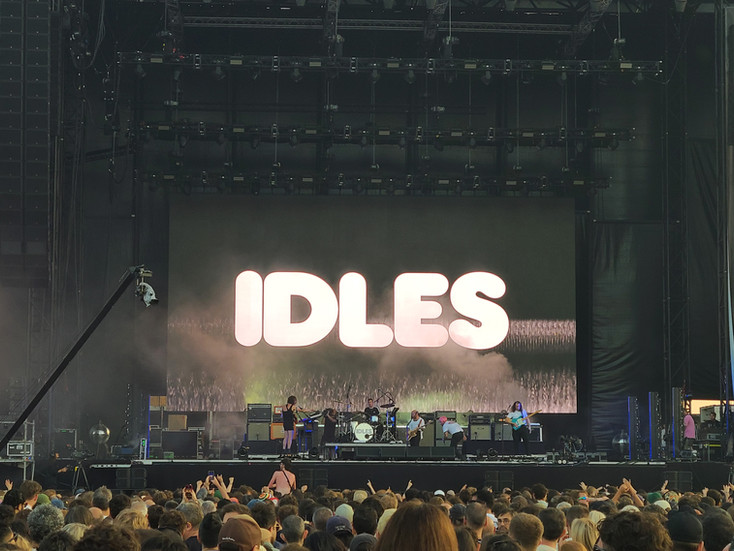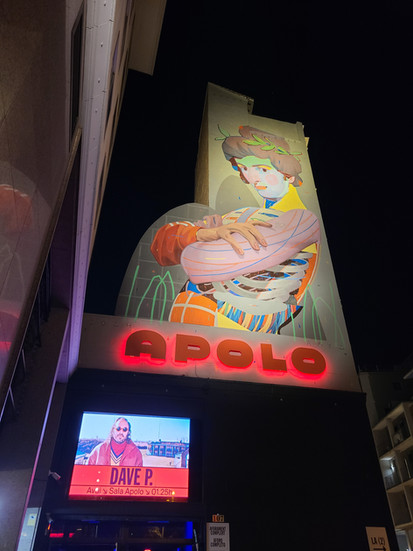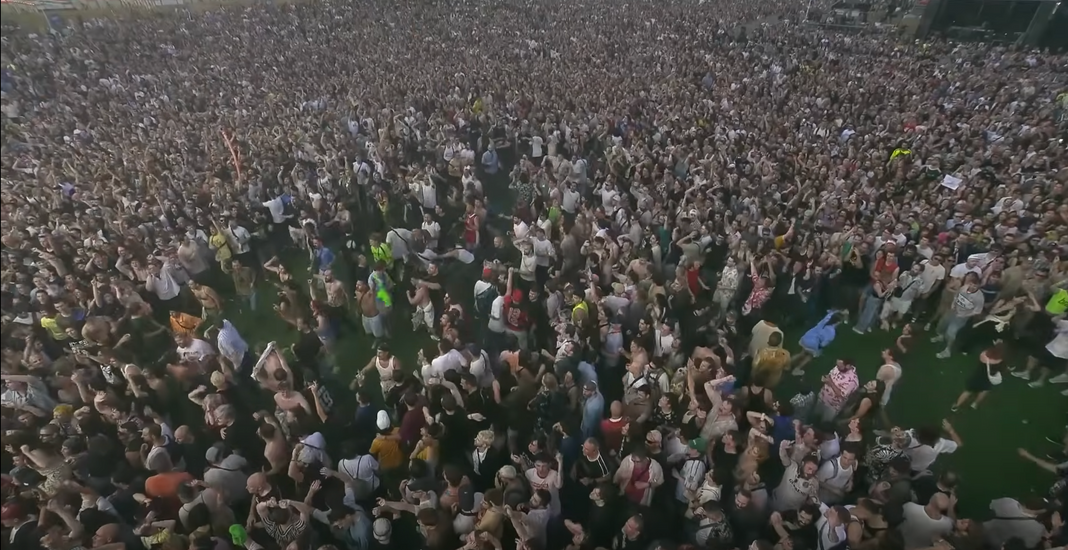Primavera Festival
- Dirty Dress

- Jul 4, 2025
- 9 min read
Updated: Sep 7, 2025
Among thunderous sound and unfamiliar hands, one writer finds brief, beautiful relief from heartbreak, where music and human closeness become a balm for the ache of impermanence.
It was the start of a Thursday, Thor’s Day, named for the god of thunder, that sound generated by the rapid expansion and contraction of air enveloped around a 50,000-degree lightning bolt. When lightning strikes, the heated air around the rambling flame compresses into a shockwave that resonates as a sound we can hear. Thunder, hotter than the surface of the sun, is the sound of heat splitting sky. I should have known this theme would be interwoven into the day, it was right there on the calendar.
That morning, I did something I wouldn't normally do; I booked an overpriced touristy guide to take me through Barcelona’s most famous church, La Sagrada Familia. I told myself it was practical, a way to skip the line and get back to Primavera Festival in time for the acts I had lined up that night. But I was seeking something else. Inside that otherworldly, impossible church, light streamed in through stained glass like liquid time. Illuminating my path in a stream of colors, the rainbow walk led me right to a terminal space where I faced a large seashell mounted on the wall. I imagined the creature who grew a shell like this, larger than my own ribcage, and wondered how it felt about having its practical protective masterpiece mounted on the wall of a religious place. Do shellfish tend to lean Catholic? I could see how they might. There must be a sense of safety combined with repression to life confined within a shell. But would it have minded being immortalized in a kind of mollusk martyrdom? And what have I ever made that compares to the grandeur of this shell, this path of light, this church, anything around me?
Surrounded by depictions of suffering — every carved sorrow on the facade, every story of sacrifice encoded in limestone — I felt my own presence shrink. I looked up at the towering narrative of divinity and death and thought about the babies King Herod ordered to be killed. What did one more life matter after a story like that? My mind drifted deep into the heartbreak of those lost, the death of God’s son, my father’s death, love lost. That love I lost that was barely even considered real, mostly texts sent over long distances: a pseudo-love that leveled me. What are the requirements for something to be real? Can longing alone make it so? Reality seemed nothing more than a feeling, a fleeting notion, a super heated moment wrapped around a shard of light —electricity casually passing through air, generating the loudest and most terrifying invisible shockwave of sound. Like lightning, love can arrive and disappear before you can see it, let alone name it, but it leaves a vibration that lingers in your ears and rattles your teeth.
The rainbow faded as my thoughts turned dark. I left the church and tried to ground myself by walking through a nearby park and ordering a chocolate a la taza. It wasn’t very good, too close to a tourist zone, but the warmth settled inside me. I walked away from the pain and weight of that lumbering church and down the hill to the tram station. The train tracks split a strip of earth where grass struggled to grow, bracketed on all sides by pavement and traffic. The platform was crowded by people in festival gear: goth blacks, splashes of CharlieXCX green, Brat green, endless summer green that will someday seem sickeningly outdated like the browns of the 70’s. The tram was too full, and I had to walk the hour and a half back to my hotel instead. By the time I arrived, I was soaked in Mediterranean humidity and my own sweat. I felt obliged to take a second shower of the day, forcing me to miss Nourished By Time. I excitedly rushed out to make it to the main stage in time for Idles, perhaps my most anticipated act of the weekend.
At the festival gates, I busted out my makeshift Spanish and asked a security guard if I was in the right place for those entering with a press pass. He explained yes, or maybe no, or perhaps my Spanish was more make than shift. I waited in the wrong line, passed through the wrong checkpoint, had to discard my hand sanitizer, and stood in yet another line to scan my ticket. When I finally reached the front, an employee told me I had to enter from another area completely, around the back. To get there, I had to push back through the crowd of thousands like a salmon fighting its way upstream. I swam right back to the box of confiscated perfume bottles and retrieved my stolen hand sanitizer. That’s when I saw another fish who was headed in the same direction and we each locked eyes. People make fast friends when they temporarily turn into fish. When you’re flailing upstream, anyone swimming beside you feels like a companion who understands your struggle. As we broke free of the human density, so did our conversation. She had also gone to the wrong entrance, was rushing to Idles, was from the States, was working as a designer, was meeting up with someone, and by the end of our jog, we hugged goodbye like old friends and split apart towards different sides of the stage to reconnect with our groups and with the performance.
I turned away from her face and was greeted by Idles frontman, Joe, in his pink mop, delicately and carelessly perched atop his grizzled, expressive face, projected across multiple, towering LED screens. How staggering to have one’s own face blown up to such an inappropriate scale. That kind of exposure is the stuff of my nightmares, yet none of the band members ever seem phased. When they perform, they each bring a naked authenticity, free and unencumbered by anyone else’s judgements or opinions. They operate inside the machine that is the music industry, but nothing about them feels manufactured. They let the full emotional weight of their music crack open on stage. Within two songs, they had lured me in from the back of the crowd and deeper into the thick of it. Standing next to two friends, I asked the girls if they wanted to join me in the pit. I received one firm no and one enthusiastic yes. Much like before with my fish friend, our eyes locked, I extended a hand, which she took, and I led us forward, touching each body I passed along the way and repeating “pardon” with a smooth rolling "r." We squeezed through the increasing tightness until the bodies were packed shoulder to shoulder. I didn’t want to push anyone too hard or be rude, but I looked at my friend and immediately saw the enthusiasm in her eyes to press forward. I couldn’t let her down. This time, I pushed the bodies apart with force and made way for the two of us to reach the pit.
By the time we reached the edge of the swirling mass of people, I was covered in the sweat of at least a hundred perfect strangers. There we were, on the edge of the mosh pit, the event horizon, a churning, swirling mass of energy that I could not escape. I allowed myself to fall fully in, getting kicked in the head by crowd surfers, toes stomped on, arms thrown around shoulders, strangers holding each other up, chaos in the mob, repeating chaos in the universe above. This was communion and vulnerability disguised as violence. No one trying to hurt anyone, just chaos as connection. Bodies compressing like air around lightning, intentionless, but loud. Strangers cradling strangers, like sound waves cradling flame. There, from my position in the black hole, I could see the god of thunder, Joe, leaning forward, elbow to knee, bright gaze penetrating all 100,000 of us, nodding in fatherly understanding, carrying wisdom from above, encouraging us to reciprocate the intensity back to him, exchanging the invisible connection. He was offering the space, making room for the expression, giving us permission to shed the straps that bind us to the every day. And the crowd told him in no uncertain terms that they wanted violence to end. He began the chant, “viva palestina,” igniting crowd energy like a strike, followed by the rolling thunder of voices carrying the phrase for long after.
Idles ended and I was sticky with joy, sweat, smudged mascara, and uneven eyeliner. My ensuing third shower of the day would be a reward earned, whenever it ultimately happened. Alone for only a moment before a familiar face emerged: a girl I’d met at a show the night before. Out of over 100,000 attendees, there she was walking right toward me, through the mass, illuminated by the glow of late afternoon light. At first meeting, I had sensed something about her I couldn’t explain — a depth, a softness, a sadness — and it had nothing to do with her appearance. I swear it had nothing to do with the soft dark curls that framed her elegant jawline or the haphazard eyeliner that made the tone of her gaze reflect the clear blue sky. I’m not one to get caught up in any of that. I didn’t know her, yet we knew each other. One of her friends held up a baguette as a signal for the other members of the group to find each other. They were light, playful, and committed to staying connected. Like the Idles pit, it was another force drawing me in.
We chatted as dusk fell, just in time for FKA Twigs to begin her dark performance. Her act is about loneliness, longing, and the pain of reaching for connection, but she might deceive a few people in the crowd as she gyrates along with her close-knit team of robust dancers in gothware. At one point in the show, she stood alone in a red dress on the right side of the stage, illuminated by a single spotlight from the far left — light traveling from afar to reach her, to reach me. She sang, “I didn’t know that you were lonely. If you had just told me… I’d be running down the hills to be with you.”
That line always gets me. It brought to mind the connection that attempted to wreck me. One built on more longing than reality. Two people drawn to each other by the ache of what they couldn’t hold, each with their own desperate need to be chosen. I stood there, unable to cry, but full of the feeling of tears. Then behind me, a voice: “you’re so cool. The outfit, the hair, you’re so cool.” I turned around to see a real face looking at mine. She was a foot shorter than me, soft, pale, beautiful, with carelessly bleached blonde hair framing eyes that held nothing back. I was stunned by her timing. A lifeline, just as I was slipping under. I opened my arms to hug her as if she’d pulled me from the sea. I asked if we could exchange numbers, maybe dance after Twigs. I didn’t say much as I worried I’d disrupt people around us. Why was I worried about that? If she had worried too, that moment never would’ve happened.
If any of us are going to bridge the loneliness gap, we have to speak up, reach out, connect. Vulnerability doesn’t live in silence. It roars, cracks, rolls: like thunder begging for a bit of sky. We have to say what we feel and risk being too much. When we’re honest, we create space for someone else to step forward too. That’s what Twigs is trying to say with the show and the album Eusexua, “never let anyone tell you your love is too much.” Some won’t be able to hold what you offer, but you have to float it out there anyway, because someone has been waiting their whole life to hear what you have always needed to say. You can’t be vulnerable if you are stuck trying to be cool or rehearsing the right lines. You have to be willing to say the things that tremble as they fall out of your mouth. True intimacy demands you be imperfect. Real closeness begins where the performance ends.
That girl saved me that night, and she proved Twigs was right. When you feel alone, you’re not alone. Festivals like Primavera are built for that purpose: gathering us in sound, tying us together with vibrations that aren’t visible but change us all the same. Sound is intangible, invisible, arguably not even real, but it moves us like puppets, or air around lightning. We can’t hold sound or cradle it like the baby it is. But it enters us, passes through us, and knits us into something whole. A fabric of feeling, made of tiny threads, each one necessary to the cohesion of the larger tapestry.
That’s why you matter. You’re not alone. Your feelings are real. Someone falls in the mosh pit and others lift her up. One body disappears from this earth, and another takes its place. We regenerate, like skin, bone, or heart meat, in an endless cycle of beginnings and endings. My heart is still broken, and in some ways it always will be. But it’s held together by something strong and unseen: the invisible thread that binds us all. Like air expanding and collapsing around a bolt of fire, our emotions pass through us — electrified, invisible, impossible to hold. That girl behind me was gone by the end of the show, not lost in the crowd, but more gently swallowed back into the collective.
Not all connections are meant to last forever, nor must they in order to be meaningful. When we release the expectation of permanence, we make space to honor what was, without suffering over what is no longer. Every journey has its own arc, and sometimes, we part ways not because the connection was flawed, but because its natural course has been fulfilled. To cling to what has passed is to resist movement forward. Connection does not require permanence to be meaningful. Like lightning, it doesn’t need to last long to make an impact. Letting go, when the time comes, is not a failure, it is an honoring of what we shared. What begins will end, and in that, we learn to love freely. Letting go, then, becomes an act of acceptance rather than abandonment, and of maturity rather than detachment — a surrender to the thunderous beauty of being alive.

































